Blog (446 found)
Take Action: Release Letpadaung Protest Prisoners!
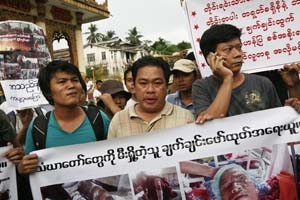 When US President Barack Obama travelled to Burma last month, in his speech at the University of Rangoon, he spoke about the need for freedom of expression and said that the “United States of America is with [the people of Burma].” Please join us in calling on President Obama to live up to his words and demand the Burma government to release all political prisoners, including those arrested for protesting against the Letpadaung copper mine in Monywa, northern Burma.
When US President Barack Obama travelled to Burma last month, in his speech at the University of Rangoon, he spoke about the need for freedom of expression and said that the “United States of America is with [the people of Burma].” Please join us in calling on President Obama to live up to his words and demand the Burma government to release all political prisoners, including those arrested for protesting against the Letpadaung copper mine in Monywa, northern Burma.
Two weeks after Obama’s trip to Burma, we witnessed the most brutal crackdown on freedom of expression since President Thein Sein took office. In the early morning of 29 November, riot police raided peaceful protest camps near the Letpadaung copper mine, firing water cannons, tear gas and incendiary devices into the camps. More than 60 monks were injured, many with 3rd degree burns. Police also arrested 8 activists in Rangoon who organized protests against the mine and the crackdown, as well as Ashin Gambira, a monk leader of the 2007 Saffron Revolution. They are all currently being held in Insein Prison […]
Protests and Arrests Rise in November – Threatens Freedom of Expression
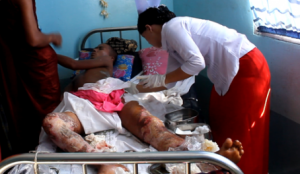 A series of both improvements and setbacks highlighted an eventful month in Burma. While advancements in international recognition made worldwide news, human rights violations persisted with far less global interest. News coverage focused on a historic visit from President Obama, and paid little attention to issues such as the government’s violation of freedom of assembly. Even as Burma stood on the world stage, the government continued a merciless crackdown on peaceful protesters.
A series of both improvements and setbacks highlighted an eventful month in Burma. While advancements in international recognition made worldwide news, human rights violations persisted with far less global interest. News coverage focused on a historic visit from President Obama, and paid little attention to issues such as the government’s violation of freedom of assembly. Even as Burma stood on the world stage, the government continued a merciless crackdown on peaceful protesters.
Among the cases of human rights violations in Burma throughout November, the blatant and unwarranted abuse of landowners and other civilians over the peaceful protest of the Letpadaung copper mine stands out as a particularly egregious offense. Since the government seized 7,800 acres of private land for the copper mine, the Burmese people have continued to exercise their right to assemble but have been met with unprovoked force […]
Violent Crackdown Against Buddhist Monks, New Regime with an Old Method
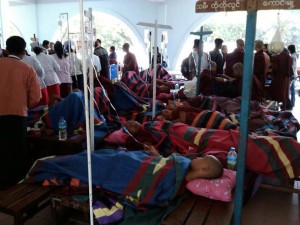 Thein Sein’s government has revealed its true colors with the surprisingly reckless and bloody crackdown on peaceful protesters in Monywa, Sagaing Region. The crackdown on the protest camps came at 3am, without any chance for the protesters to withdraw. It was an ambush and an old tactic that characterizes the old military regime that the world has been trying to believe has reformed.
Thein Sein’s government has revealed its true colors with the surprisingly reckless and bloody crackdown on peaceful protesters in Monywa, Sagaing Region. The crackdown on the protest camps came at 3am, without any chance for the protesters to withdraw. It was an ambush and an old tactic that characterizes the old military regime that the world has been trying to believe has reformed.
The Letpadaung copper project near Monywa – the largest copper mine in Burma – is a joint venture between military-owned Union of Myanmar Economic Holdings Ltd., and Wan Bao, a unit of the weapons manufacturer China North Industries Corp. The project has been facing a growing objection since August by the local communities in the Letpadaung area who say the project has confiscated as many as 7,800 acres of land, forcing them out of their villages and ruining the environment.
Riot police aggressively dispersed protesters using water cannons, tear gas and, according to protesters, incendiary devices that set the camps on flames leaving at least 50 people injured by the fire. Many of those who were severely wounded were Buddhist monks […]
• • •Burma’s Reform Process Must Include Ending Violence Against Women
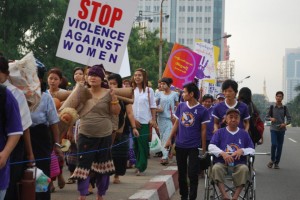 Yesterday, as on every 25 November, women and men around the world celebrated the International Day for the Elimination of Violence against Women. Violence against women takes many forms, physical, sexual, psychological and economic and occurs all around the world and in every culture. Burma is no exception to that rule.
Yesterday, as on every 25 November, women and men around the world celebrated the International Day for the Elimination of Violence against Women. Violence against women takes many forms, physical, sexual, psychological and economic and occurs all around the world and in every culture. Burma is no exception to that rule.
Women in Burma, and in particular in ethnic nationality areas, are the victims of sexual violence, sexual exploitation, human trafficking and discrimination. In addition, in situations of armed conflict and extreme poverty, they are often amongst the most vulnerable population and they bear the burden of war and displacement.
Rape has been used as a weapon of war by the Burma Army in ethnic areas for decades. In Kachin State where fighting has been ongoing for more than one year, the Kachin Women’s Association – Thailand (KWAT) has documented that Burma Army troops have committed sexual violence against at least 61 women and children, about half of whom were killed […]
• • •“The Political Prisoners Game”
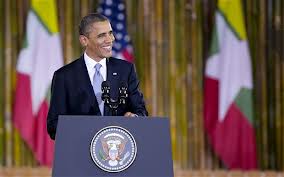 As US President Barack Obama visited Burma today, the Thein Sein government continues to pursue positive headlines in a cynical move to release political prisoners at the same time as Obama’s arrival.
As US President Barack Obama visited Burma today, the Thein Sein government continues to pursue positive headlines in a cynical move to release political prisoners at the same time as Obama’s arrival.
Last Thursday’s release of 452 prisoners was a huge disappointment as no political prisoners were among them, with the Assistance Association for Political Prisoners calling it “the worst amnesty ever”. Today, 19 November, however, at the time of publication 45 political prisoners have been released. This ploy by the government usually coincides with a visit of an international figure or a decision made by the international community on Burma. In September, 87 political prisoners were released the week before President Thein Sein went to New York for the UN General Assembly. In July, 25 political prisoners were released shortly before the US lifted its investment ban and Thein Sein met with US Secretary of State, Hillary Clinton, in Cambodia. This time, it is because President Obama is coming to Burma. “It seems there is a new game in Burma, which is the political prisoners game,” Phil Robertson from Human Rights Watch stated, highlighting the lack of integrity of these releases […]
Obama’s Upcoming Visit Provides Hope and Potential Danger for Burma’s Transition
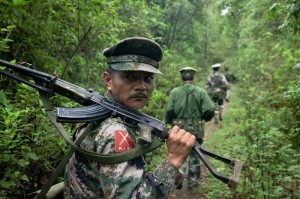 One of the first things that re-elected US President Barack Obama announced was a visit to Burma to coincide with the East Asia Summit in Phnom Penh. While it is true that the possibility of such a visit shows the progress Burma has made, it is also dangerous in that it bestows an excessive amount of legitimacy on a military backed government that continues to commit grave human rights violations, particularly in ethnic areas.
One of the first things that re-elected US President Barack Obama announced was a visit to Burma to coincide with the East Asia Summit in Phnom Penh. While it is true that the possibility of such a visit shows the progress Burma has made, it is also dangerous in that it bestows an excessive amount of legitimacy on a military backed government that continues to commit grave human rights violations, particularly in ethnic areas.
While President Obama is in Burma, he should highlight and condemn human rights abuses, not only in Arakan State, but in all areas. Meanwhile, this would be a perfect opportunity for the US to learn of some of the unintended consequences of lifting sanctions. The huge increase in land confiscations by military elites and their cronies is dispossessing more and more people every day. The imminent rush of foreign direct investment, such as that from the US, is catalyzing this process […]
Latest Opium Cultivation Figures for Burma Maintain Worrying Status Quo
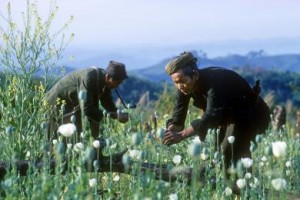 A UN Office on Drugs and Crime report released last week reveals that opium cultivation has increased in Burma for the sixth consecutive year. In 2012 there will be an estimated 690 tons of opium grown in the country, a 17% increase from last year and double that of six years ago.
A UN Office on Drugs and Crime report released last week reveals that opium cultivation has increased in Burma for the sixth consecutive year. In 2012 there will be an estimated 690 tons of opium grown in the country, a 17% increase from last year and double that of six years ago.
Poverty, caused by the inability of people to participate in sustainable livelihoods due to armed conflict and repression is a causal factor for this increase in opium cultivation. There has been much focus on Burma over recent political developments, the release of political prisoners and the easing of media restrictions. However, there has been very little focus on the lack of alternatives for people living in the conflict areas of Shan and Kachin States, where the majority of opium production occurs. There is a direct link between ongoing conflict and opium cultivation. “There is no question that there is a strong connection between the conflicts in the country and the most immediate sources of revenue to purchase weapons, and in many instances this is both opium and heroin and methamphetamine pills,” says Gary Lewis, the United Nations Office on Drugs and Crime regional representative […]
Keep Human Rights on the Agenda for Burma
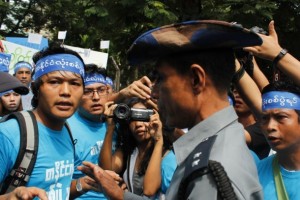 This week Tomás Ojea Quintana, the Special Rapporteur on the situation of human rights in Burma, presented his latest report to the United Nations General Assembly (UNGA) that will adopt, in a few weeks, its annual resolution on the situation of human rights in the country.
This week Tomás Ojea Quintana, the Special Rapporteur on the situation of human rights in Burma, presented his latest report to the United Nations General Assembly (UNGA) that will adopt, in a few weeks, its annual resolution on the situation of human rights in the country.
Since the lifting of sanctions and the renewal of diplomatic ties with the Burma government by many foreign countries, the UNGA resolution is one of the last tools remaining in the hands of the international community to encourage the government to turn the preliminary changes of the last year into more concrete democratic reforms.
Despite recent developments in Burma, the root causes of armed conflict still haven’t been addressed and human rights violations are ongoing, serious and prevalent throughout the country.
This week, the violence in Arakan State errupted again with more than a hundred victims in a week. Meanwhile, fighting in Kachin State continues and Mr. Quintana said in his press statement, “I have received allegations of attacks against civilian populations, extrajudicial killings, sexual violence, internal displacement, torture, forced labour and portering, as well as the ongoing use of landmines and the recruitment of child soldiers, by all parties to the conflict.” […]
• • •No More Than a Semblance of Freedom of Assembly, Association and Expression
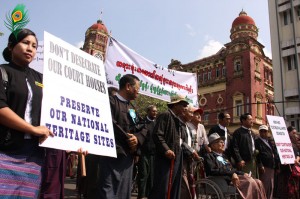 Like many of Burma’s other reforms including the easing of restrictions on media, there is a darker side to the semblance of freedom of assembly, association and expression that has recently been commended in Burma.
Like many of Burma’s other reforms including the easing of restrictions on media, there is a darker side to the semblance of freedom of assembly, association and expression that has recently been commended in Burma.
President Thein Sein’s office has been urging ministries to remove some 4,000 people remaining on the blacklist. However, some returning exiles have been asked to sign agreements that they will not do anything that could “harm the state.” The agreement says that exiles can repay the government’s “generosity” by avoiding actions that would disrespect the government and not participate in actions or publish anything that would harm the country’s stability, which hark back to language used by the military regime.
Within the country, lawyers, activists, farmers and local villagers have been protesting on a range of crucial issues including land confiscation, mining projects, electricity shortages, the preservation of cultural heritage buildings in Rangoon and the need for nationwide peace. Those who speak out on issues that are sensitive to the government are detained, charged or threatened by authorities. One of the biggest cases at the moment is that of the thirteen organizers of the peace protest on 21 September who are facing court cases in 10 different Rangoon townships for protesting without permission. They are required to appear at court hearings nearly every day and must inform the authorities if they plan to leave Rangoon […]
New Lending Must Address Challenges on Burma’s Road to Development
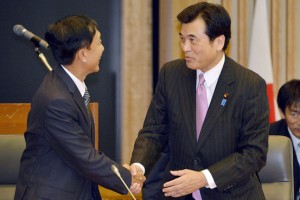 On 11 October, Japan announced that it would be resuming loans to Burma. It also hinted that it will assist the heavily indebted country in clearing its arrears and establishing good financial standing with international financial institutions, such as the World Bank and the Asian Development Bank.
On 11 October, Japan announced that it would be resuming loans to Burma. It also hinted that it will assist the heavily indebted country in clearing its arrears and establishing good financial standing with international financial institutions, such as the World Bank and the Asian Development Bank.
Japan will be forgiving US$3.7 billion or about 60% of the total $6 billion debt Burma owes; it is also planning to use bridge loans by Japanese banks to help clear Burma’s $900 million of arrears with the World Bank and the Asian Development Bank. Japanese Finance Minister Koriki Jojima stated, “Japan is planning to resume its full program in Myanmar with yen loans to help support Myanmar’s sustainable economic development…at the earliest possible timing next year.” He further explained that Japan’s development priorities in Burma would focus specifically in the areas of electricity and road rehabilitation, rural development and improvement of port facilities.
At this moment in time, Burma’s re-entry into the world economy, specifically the ability to take loans from institutions such as the World Bank, the Asian Development Bank and Japan itself, carries great risk. The type of projects to be funded, the rate of investment, the sectors in which investment will take place, the presence of monitoring mechanisms, and the decision-making process are just some of the factors that will determine the long-term outcome of international financial support […]









 All posts
All posts